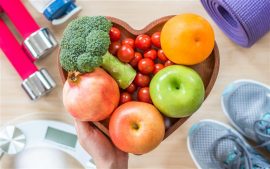By Angela Ambrose, contributing writer
 With a wide array of diets on the market, it can be tough to weed out all the fad diets and find a nutritionally well-balanced diet that is rooted in sound science and also simple to follow over the long haul.
With a wide array of diets on the market, it can be tough to weed out all the fad diets and find a nutritionally well-balanced diet that is rooted in sound science and also simple to follow over the long haul.
“It’s easy to be overwhelmed, but don’t get sucked in by all the fad diets,” says Katherine Beals, associate clinical professor of nutrition and integrative physiology at the University of Utah. “Sticking to the tried and true research-based recommendations is the best way to go. It’s pretty basic – fruits, vegetables, whole grains, lean sources of protein and low-fat or non-fat dairy.” These nutrition recommendations stand the test of time and are summed up in the U.S. government’s “Dietary Guidelines for Americans” that have been around for decades.
Not surprisingly, the Mediterranean Diet, which closely mirrors these guidelines, has been rated the No. 1 best diet overall for three straight years by U.S. News and World Report. Tied for second place is the Flexitarian diet and DASH diet, which stands for dietary approaches to stop hypertension.
Rather than strict diets, all three are more accurately defined as healthy eating patterns with no foods off-limits. Each emphasizes whole, plant-based foods with a few minor differences. The Mediterranean diet adds more healthy fats, such as olive oil and nuts, as well as red wine, if desired. The DASH diet is designed to lower blood pressure and focuses on cutting sodium and saturated fat. The Flexitarian diet is primarily a vegetarian diet with the “flexibility” of adding in an occasional serving of meat or fish, when you get a hankering for it.
The Downside to Fast Weight Loss
Choosing the best diet depends on your ultimate goal. For example, if you want to lose weight very quickly so you can look slim and trim in your wedding dress or tux in five weeks, then a weight loss diet like HMR, Optavia, Atkins or Ketogenic may be a good short-term option. Despite their popularity, these same low-carb, high-fat diets fall to the bottom of the list for diabetes, heart disease and overall health.
“You will lose weight fast, but it’s not sustainable,” says Beals. “You can only do it for so long and then you start adding foods back in that you’re missing. And before you know it, you gain weight back.” Plus, they are nutritionally unbalanced and often require vitamin and mineral supplements.
If you’re looking to cut weight and keep it off, Beals suggests skipping these trendy fast weight loss diets and following the universal rule for shedding pounds.
“I don’t care who you are or what you do – the only way you’re going to lose weight is if you’re eating fewer calories than you’re expending. How you do that is highly individualized.”
The best diet for losing weight is the one that matches your lifestyle, personality and food preferences. For example, if ongoing support and guidance is important to you, consider Weight Watchers (rebranded as WW), which received the U.S. News’ top rating for weight loss and best commercial diet. The Vegan and Volumetrics diets tied for second place in the weight loss category.
Carbs, Protein and Fat – Your Body Needs Them All
Instead of restrictive diets that eliminate entire food groups, look for healthy eating patterns that include all three macronutrients – carbohydrates, protein and fat – and adjust the amounts of each to match your health goals.
While many of today’s fad diets drastically cut or eliminate carbs, Beals says they are a critical part of a healthy diet. “Carbohydrate-rich foods like fruits, vegetables and whole grains are the foods that provide the bulk of our vitamins, minerals and fiber, so if you don’t eat carbohydrates, you’re missing out on all those nutrients,” says Beals. The key is to select nutrient-dense carbs and go easy on the empty calorie carbs like soda, sweets and refined grains that are easy to overeat.
Higher Protein Aids Weight Loss
One proven way to lose weight is to bump up the protein in your calorie-reduced diet. “There’s ample evidence to suggest if you increase your protein intake, while consuming moderate amounts of nutrient-dense carbohydrates and healthy fats, you not only will lose weight, but also the composition of that weight loss will be more favorable,” says Beals. “You’ll lose more fat while maintaining lean tissue.”
Whether it’s a pork chop, chicken breast, salmon fillet or beans, tempeh and quinoa, eating more protein can make you feel full longer, so you’ll be less likely to snack in between meals or fill up on empty calories.
Which diet is right for you?
For those concerned with lowering their risk of chronic diseases such as diabetes, hypertension or heart disease, any of the eating plans that emphasize whole, plant-based foods and low saturated fats are sensible choices – from the Ornish, Mayo Clinic or Nordic diets to the MIND diet, which combines the Mediterranean and DASH principles with a focus on brain-healthy foods such as berries and leafy greens.
No single diet is right for everyone. Select one that is nutritionally balanced, allows you to maintain a healthy weight and matches your palate and lifestyle.
Don’t forget the other key ingredient for overall good health – regular exercise. All eating plans are more effective when combined with daily physical activity. Not only will you burn more calories and be more likely to keep the pounds off, but you will also build stronger muscles, bones and immune system, which may add years to your life.

